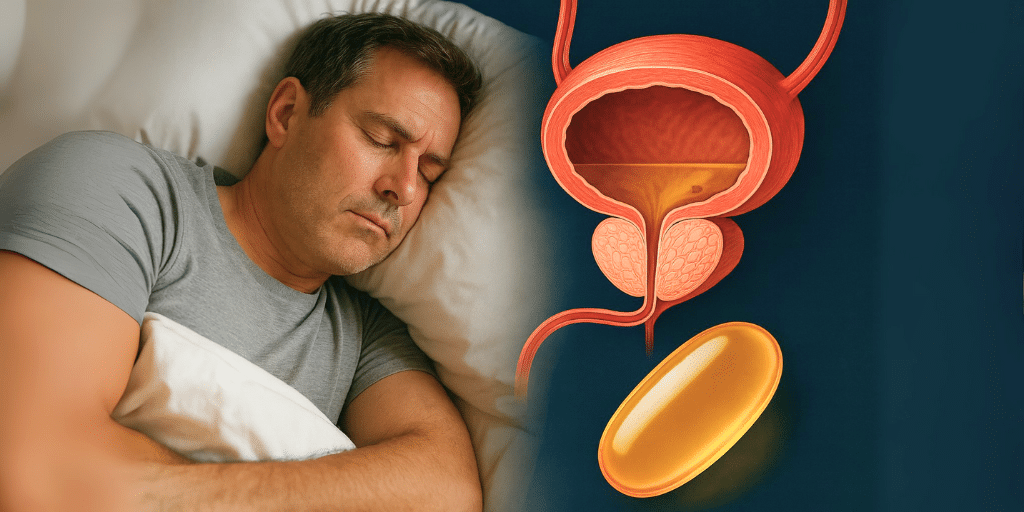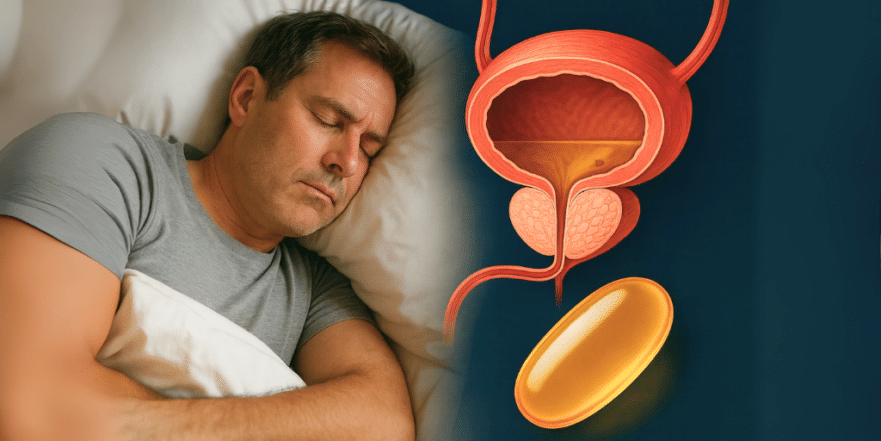
Does this sound familiar? The clock glows with the numbers 4:00 AM, and you’re awake again. Not because of a bad dream, but because of that nagging urge to go to the bathroom. That single interruption shatters your sleep, leaving you drained, foggy, and irritable for the entire day.
You might have been told that this is just an inevitable part of getting older, a sentence you simply have to accept. But you don’t have to resign yourself to a life of fragmented sleep and exhausting days. I’m not here to give you generic advice like “drink less water.” I’m here to tell you the truth about what causes this problem and give you a clear, effective protocol to solve it. Stay with me, because this knowledge won’t just change your nights—it will give you back the life that poor sleep has stolen from you.
This frustrating issue of waking up at night to urinate has a medical name: nocturia. And while it’s incredibly common, I want you to remember this: It is not normal. It is not an unavoidable consequence of aging. It is a warning sign your body is sending you, and the consequences of ignoring it are far more serious than most people realize. It’s time to understand the root causes and take back control of your nights.
Key Takeaways
Nocturia Is a Health Risk: Waking up frequently to urinate is more than an annoyance; it significantly increases your risk of falls, cognitive decline, heart problems, and emotional distress.
Common Myths Make It Worse: Widely believed myths, such as drastically reducing water intake or blaming a “small bladder,” are counterproductive and can exacerbate the problem.
The Causes Are Physiological: Nocturia is often caused by hormonal changes (decreased ADH), fluid redistribution from your legs, and deficiencies in key nutrients like Vitamin D, which affects bladder muscle health.
A Strategic Plan Works: You can solve this problem with a multi-pronged approach that includes optimizing Vitamin D, timing your fluid intake correctly, and using specific techniques to empty your bladder and manage fluid retention before bed.
1. The Hidden Dangers of Nighttime Bathroom Trips
Those nightly walks to the bathroom are not as harmless as they seem. They carry significant risks that can impact your physical safety, cognitive function, and overall health. Let’s break down the dangers hiding in the dark.
The Risk of Falls: First and most obviously, there’s the risk of falling in the dark. When you’re half-asleep, your balance is poor, and the path to the bathroom can become an obstacle course. A fall at 70 is not the same as a fall at 30. A hip fracture can be the beginning of an unstoppable physical decline, leading to a loss of independence and a cascade of other health issues.
The Toll on Your Brain: Deep sleep isn’t a luxury; it’s your brain’s essential cleaning service. During this phase, your brain actively clears out waste toxins that accumulate during the day, such as the beta-amyloid protein associated with Alzheimer’s disease. When your sleep is fragmented night after night, this cleaning process is incomplete. The short-term result is brain fog and poor memory. In the long term, you face an increased risk of developing neurodegenerative diseases.
The Strain on Your Heart: Every time you wake up abruptly, your body releases stress hormones like cortisol and adrenaline. Your blood pressure and heart rate spike. Subjecting your cardiovascular system to this constant stress is directly linked to a higher risk of hypertension, heart attacks, and other serious cardiac problems. Your heart needs the restorative rest of uninterrupted sleep to function optimally.
The Emotional Cost: Chronic fatigue sucks the joy out of life. It can make you feel apathetic, irritable, and anxious. You stop feeling like yourself and become a gray, exhausted version of who you used to be. Your relationships, hobbies, and overall sense of well-being suffer when you’re constantly running on empty.
2. Why Does This Happen? The Real Culprits
To fix the problem, you have to understand why it’s happening. While aging plays a role, it’s not the whole story. Here are the primary factors that contribute to nocturia.
Prostate Health (For Men): If you are a man over 50, your first step should be to get your prostate checked. An enlarged prostate can press on the bladder and urethra, causing frequent urination. This is a medical issue that your doctor can help you manage effectively.
The Decline of a Key Hormone: Your body produces a hormone called antidiuretic hormone (ADH). Think of ADH as the night shift manager for your kidneys, telling them to slow down urine production so you can rest. As you age, your body naturally produces less ADH. This “manager” becomes less effective, and your kidneys continue producing urine at a daytime pace, filling your bladder while you’re trying to sleep.
The Hidden Fluid Shift: This is a cause almost no one talks about. If you spend a lot of time on your feet during the day and notice that your ankles or lower legs swell, that fluid doesn’t just magically disappear. The moment you lie down, gravity’s effect ceases. All that accumulated fluid returns to your bloodstream, gets filtered by your kidneys, and goes straight to your bladder, triggering an urgent need to urinate a few hours after you go to bed.
The Surprising Role of Vitamin D: Your bladder isn’t just a passive storage bag. Its wall is made of a powerful muscle called the detrusor muscle. The cells of this muscle have a high number of Vitamin D receptors. Research shows that people with a Vitamin D deficiency experience more urinary symptoms, including urgency, leakage, and incomplete emptying. Correcting a Vitamin D deficiency is a fundamental step in strengthening your bladder and improving its function.
3. Debunking 3 Common Myths That Make Nocturia Worse
Before we get to the action plan, we need to clear up some common misconceptions that are likely making your problem worse.
Myth #1: “To avoid peeing at night, I should drink as little water as possible.”
This is the most common and damaging mistake. By deliberately dehydrating yourself, you force your body into survival mode. It produces highly concentrated urine, which is extremely irritating to the lining of your bladder. This constant irritation makes your bladder hypersensitive, causing it to send false “go now!” signals even when it’s not full. Paradoxically, drinking too little during the day can condemn you to waking up more at night.Myth #2: “I just have a small bladder.”
In the vast majority of nocturia cases, the problem isn’t the size of your bladder’s “storage tank.” The issue is the production rate of your kidneys at night and the return of fluid from your legs. You could have the largest bladder in the world, but if your kidneys are working overtime while you sleep, you’re still going to wake up.Myth #3: “A glass of wine or beer at night helps me relax and sleep.”
This myth is particularly dangerous. Alcohol is a potent diuretic; it gives a direct order to your kidneys to produce urine as if there’s no tomorrow. Furthermore, alcohol actively blocks the release of your precious ADH, the hormone that’s supposed to be putting the brakes on urine production. So, you’re doing three things wrong at once: consuming liquid, taking a diuretic, and disabling the only natural brake your body has. Avoid alcohol completely, especially in the 3-4 hours before bedtime.
4. Your 3-Step Action Plan for Uninterrupted Sleep
Now that you understand the causes and myths, let’s move on to the practical, science-backed action plan to solve this.
Step 1: Optimize Your Vitamin D and Get Some Sun
If you have a Vitamin D deficiency, correcting it can significantly help strengthen your bladder. The first step—and this is non-negotiable—is to talk to your doctor and request a blood test to check your levels. Only then will you know the appropriate supplement dosage for your body. To complement this, try to get 15-20 minutes of early morning sun exposure without sunscreen. This stimulates your body’s natural Vitamin D production.Step 2: Master Your Fluid Intake
This isn’t about drinking less; it’s about drinking smarter. The golden rule is simple: aim to consume about 75% of your total daily liquids before 4:00 PM. This gives your kidneys the entire afternoon to process the bulk of that fluid, so they can slow down at night. Keep a water bottle with you and sip steadily throughout the morning and early afternoon, then taper off significantly in the evening.Step 3: Use Strategic Fluid Release Techniques
These two techniques are game-changers that enhance everything else you’re doing. Double voiding: Just before bed, go to the bathroom, sit, urinate. When done, wait 30 seconds, relax, and urinate again without forcing. This extra step can prevent nighttime waking.
Gravity elevator: One to two hours before sleep, raise your legs above your heart. This way, gravity helps drain accumulated liquid, which you eliminate before sleeping.
Conclusion
This protocol isn’t magic; it’s science, physiology, and strategy. Nocturia does not have to be your life sentence. It’s not about resigning yourself to poor sleep; it’s about understanding what’s happening in your body and taking decisive action on multiple fronts. Vitamin D might be a key piece of the puzzle if you’re deficient, but the real power lies in the combination: adjusting your hydration habits, managing fluid retention in your legs, ensuring your bladder is truly empty, and avoiding alcohol at night.
Think about what you stand to gain: full nights of restorative sleep, mornings filled with energy, a lower risk of dangerous falls, and greater mental clarity. You have the power to change your nights and reclaim your days. It’s time to get started.
Source: Sento Segarra (Pharmacist)

